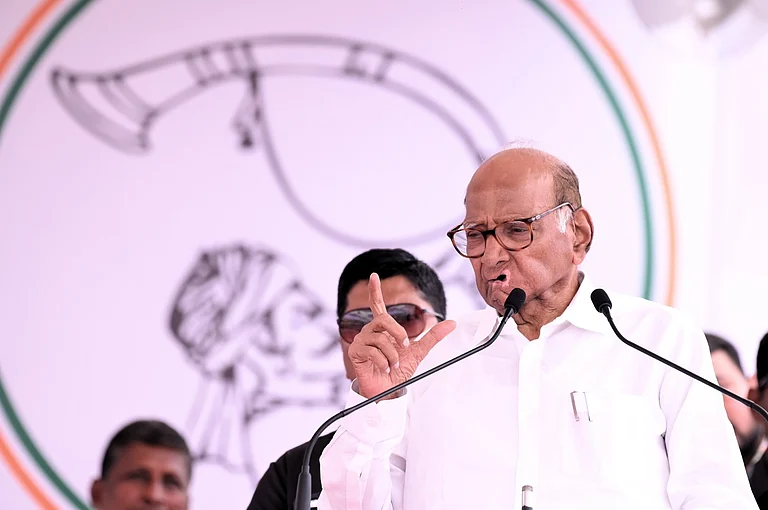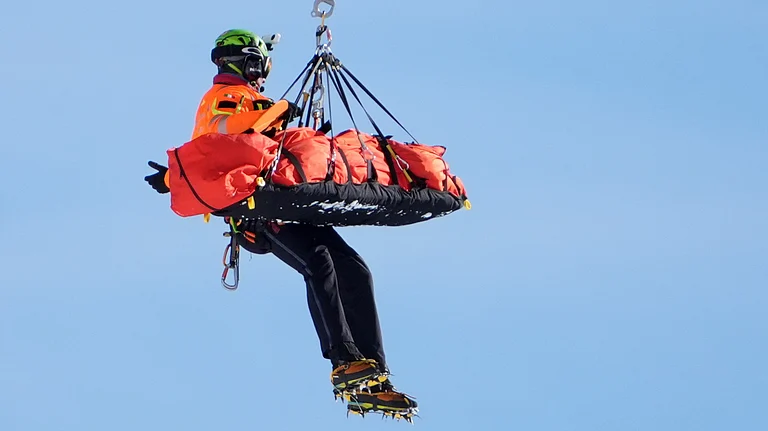A note issued by the joint secretary (planning and international cooperation) in the defence ministry in the last week of June specifically asks the army, air force and navy headquarters not to invite any US military delegations to India till end-March 2007. The note clearly spells out that this has been "discussed" with the defence minister and has his approval. The reason cited by the note for the ban is that the "increased number of delegations to and from the United States will send out the wrong signals to other traditional allies such as Russia and France".
While the note was greeted by a considerable degree of consternation within South Block, sources say that its timing couldn’t have been worse. "With the Indo-US nuclear deal at a crucial stage, this is hardly the time to issue such notes," a senior official in the defence ministry told Outlook. However, the defence ministry sought to play down the note. The official spokesman, Sitanshu Kar, told Outlook that it was a "routine internal reassessment done by the MoD to ensure that interactions with a particular country or countries do not get bunched up. The effort is to space out the interactions so that more countries can be accommodated." Which means, while the United States is on the MoD’s banned list till March next year, other countries will get top billing.
According to sources, even defence secretary Shekhar Dutt was uncomfortable with it when it was issued. According to defence ministry officials, the note is bound to send out wrong signals to the Americans. That too at a time when the House of Representatives is all set to debate changes in US laws to facilitate the nuclear deal and the Senate is gearing up to give it the final nod. Obviously, the nuclear agreement was not factored in by the MoD before the note was issued.
The number of visits by military delegations from the US have been the highest by any country of late. In 2005, there were over 50 visits averaging one visit per week. But sources say the number of visits was not the actual problem. Many in the defence ministry feel the ban is a fallout of the massive security breach in the NSCS and India’s external intelligence agency, RAW. The espionage case, say sources, has had a negative impact on a relationship that was gaining from "strength to strength".
Roseanne Minchew, a third secretary in the US embassy in Delhi, is suspected to have played a role in collecting classified documents from three officials associated with NSCS and RAW. One of the officials, Commander Mukesh Saini, was heading the Indo-US cyber security who is reported to have been the first one to pass on secret documents to Minchew.
But analysts feel that domestic political factors as well as the pressures from coalition partners could have resulted in the MoD issuing the note. Says Air Commodore Jasjit Singh, director, Centre for Air Power Studies: "The MoD is being over-sensitive to their coalition partners. The real issue has less to do with increased American visits and more to do with the political pressures on the UPA government."
Predictably, the note has brought considerable cheer to the Left parties. The CPI(M)’s Nilotpal Basu, who recently described the Indo-US "strategic" relationship as a dangerous "bear-hug" in the official party mouthpiece People’s Democracy, is happy but feels more caution must be exercised. "This is not enough," he says. "The MoD should be more comprehensive in its approach about the pitfalls of cobbling together an exclusive ‘strategic relationship’ with the US. The relationship with the US has started to alienate nations with whom we have had an otherwise traditional relationship. Instead, India must show interest in promoting multi-polarity rather than putting all its ‘strategic eggs’ in one proverbial basket."
While Basu has a point, these pitfalls in the emerging Indo-US relationship had already been reflected in a report and taken serious note of by the Pentagon. The study—‘Indo-US Military Relations: Expectations and Perceptions’, conducted in 2002-03 by the Pentagon’s Net Assessment office—had predicted such hurdles in the emerging alliance. It noted that the Indian bureaucracy would be a major hurdle in the emerging partnership. Indian bureaucrats, the report said, "harbour deep-seated distrust of Americans" and are mostly "obsessed" with history rather than the future and "see the world through their perennial distrust of Pakistan". In fact, sources told Outlook that the cold reaction by the US to India’s claims of a "Pakistani hand" in the recent Mumbai blasts is indicative of how the Americans view their partnerships in the subcontinent.
Either way, most analysts agree that the ban on American visits is uncalled for. Brigadier Arun Sahgal (retd), deputy director (research) at Delhi’s United Services Institution and a keen observer of Indo-US relations, describes the move as a "negative step". According to him, "This is a premature and preventive reaction rather than a well-thought out policy". This may well be true because sources in the ministry of external affairs say that they were not consulted and did not have any indication of the MoD ban.
In the last five years, the relationship between the Indian and US militaries has been largely tactical rather than strategic. These have translated into defence and special forces joint exercises on a relatively small scale. There have been a few high points such as the joint patrolling of the Malacca Straits during the Gulf war by the Indian and US navies but it’s never gone beyond that.
But the emerging dynamics of a buyer-seller relationship between India and the US could suffer the most. India’s military, with nearly 70 per cent of its equipment of Russian origin, is keen to shift its procurement to the West. This has already impacted its relationship with Russia, which is inching closer to China that has emerged as the largest market for the arms and technology of the erstwhile Soviet Union.
The MoD should have ideally coordinated with the PMO and the foreign ministry before the ban. Its ramifications are already being felt as an Indian delegation headed by a joint secretary on cyber warfare to the US has been put on hold. Another visit by a high-level defence delegation from the US to India in September is also likely to be called off. Certainly, all this does not fit into the PM’s "strategic partner" script.


























